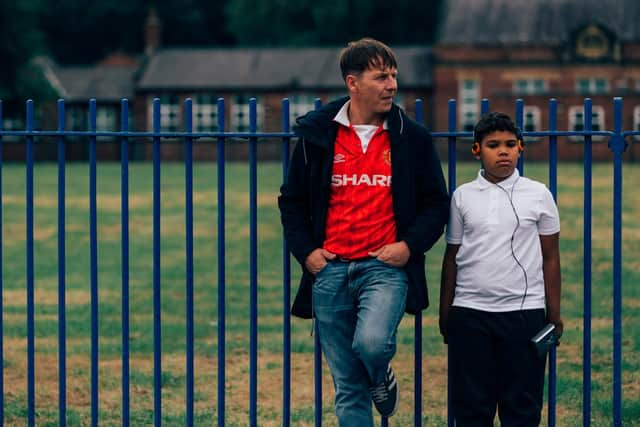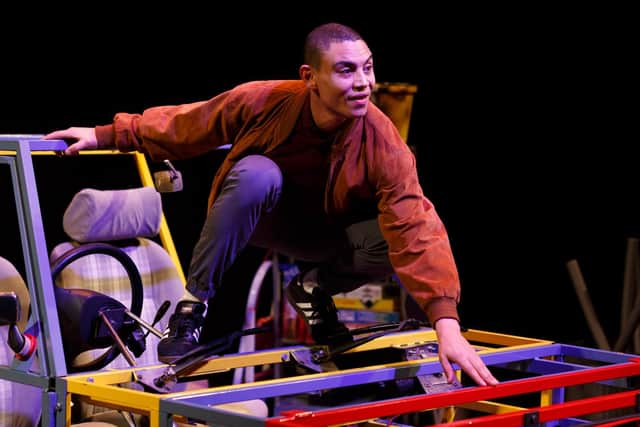Ex-Hollyoaks actor David Judge looks at his own life as a mixed-race child through his father’s eyes


But as he puts it: ‘The black in me left before I was born, the blood in me left when I was seven years old. The only person to get me where I am now is this white man with tattoos on his knuckles, who listened to Rod Stewart and drove a Ford Capri.’
SparkPlug is David’s autobiographical one-man show, but as it is seen through the eyes of the man he calls dad – his adoptive father.
Advertisement
Hide AdAdvertisement
Hide AdThis thought-provoking show is a punchy and poetic exploration of family, race, identity and love. On tour across the UK, it is inspired by events in David’s childhood, it is unflinching in its portrayal of real situations as it explores racism, violence and masculinity.


For most of the show, David puts himself in his adoptive father’s shoes.
David explains the show: ‘It’s based on the first 10 years of my life, as I remember them, but told through my dad.
‘It’s been interesting, it’s been a little confusing at times for some audience members as he’s called Dave Judge and I’m David Judge, but for me it’s a challenge worth doing, and it’s made the piece of theatre really ambitious.
Advertisement
Hide AdAdvertisement
Hide Ad‘It’s book-ended by me as myself. Obviously I’m a light-brown person playing a white person for the majority of the piece. I would rather share that challenge with my audience than make it easy for them – I always prefer it when my brain’s being used.’


At the time we spoke, Dave had yet to see SparkPlug, although David adds: ‘Other members of his family have, and they love it, they received it well.
‘My mum, who I’m not on great terms with, she’s read it, and I can quote her directly, she said: “It’s very fictional, I hope the audience enjoy your father’s version of your memory.” That gives you an insight into the relationships that happen throughout the story.’
So how did he go about writing his own story, but from his father’s perspective?
Advertisement
Hide AdAdvertisement
Hide Ad‘I think you go on the only ingredient you can, and that’s love and nurture. At the heart of it, I’m an actor telling a story – I was a writer with a real story who had to write a play for an audience. It can’t be me having therapy or going through anything cathartic on stage, otherwise it’s not right to charge people to come and watch me doing that.
‘So when I’m approaching it, I’m not worrying about me playing my dad disciplining me, or me playing my dad worrying about me, I’m thinking about the character and how it effects the character and I think that makes it easier for me to separate myself from the emotion.’
The former Hollyoaks actor (he played Danny Valentine in 2007/8) has also come to realise the weight of others’ expectations on him as a writer.
‘I started writing about three years ago, and luckily people are interested in my voice, but all of a sudden, I’m not just a writer – I’m a “black writer” and I have a responsibility to tell other people’s black stories, which I don’t know! I have no black grandparents, I have no roots in Jamaica or Africa – and I only know my story as it is.
Advertisement
Hide AdAdvertisement
Hide Ad‘I really want to bring cultures together and not put a wall between us. Sometimes as a “black writer” it’s like you have to write about slavery or something like that, but actually, I wanted to celebrate my dad.
‘If we all closed our eyes and thought who is the “Brexit man”, you’d see him, and I want to bridge that gap. I want to clear the blurred waters around how we see race and what stories belong to what people.
‘I get asked about what black culture do you know? What black food do you eat? What black clothes do you wear? And stuff like this.
‘I remember being questioned by a black bus driver once, he must have been in his 60s and he didn’t trust the fare that I was trying to pay.
Advertisement
Hide AdAdvertisement
Hide Ad‘Trying to relate to him I said: “Mate, brother, y’know what I mean, you’re an ethnic, don’t you know how hard it is for me?” And he sucked his teeth at me, and said,’ David adopts a convincing West Indies accent: ‘”You know nuttin’ about me, I came over here with no Irish, no dogs.” And all of a sudden I thought, damn, I don’t know anything about you! I’m first generation mixed-race. You might be a first generation black person in this country, but I’m a first generation mixed-race person here, and you can’t help me with that, my parents can’t help me with that. Black people can’t help me with that, white people can’t help me with that.
‘When I went to college at 19 I suddenly had a group of five friends who were all mixed-race, and that was the first time I was able to speak to someone about how black people speak to us and how white people speak to us.
‘People look at me and expect that I’m into hip-hop and R&B and stuff like that. They don’t think that I might be into Oasis and guitars and Adidas Samba, I just want to be a Mancunian and accepted as that. And that’s part of my story.’
While David is acutely aware of all of these things, it’s clear he wants to tell his story, his way. By his own admission he was ‘a bit of a rogue’ growing up, ‘I was chucked out of school, failed at being a drug dealer.’ It was going back to college and then auditioning for the National Youth Theatre that turned his life around.
Advertisement
Hide AdAdvertisement
Hide Ad‘It’s great for me that the play for me is so embedded in Manchester and my personal story, but it is also universal, and the fact of the dual-heritage child, the parents, the society, what other children will say about that – I hope it’s a story that everyone can take ownership of.’
He also hopes it will help start important conversations – after the show there will be a Q&A session.
‘The subject matters in the play, if we were to talk about them in the pub, a lot of people would just stop talking because they’re seen as taboo – we feel we’re not gaining anything by talking about these things and it’s going to lead to an argument.
‘But in the theatre, it’s a safe space and these topics have sparked really interesting conversations and it’s only through talking that we can get closer, that we can understand each other.
Advertisement
Hide AdAdvertisement
Hide Ad‘To assume, and go: “They’re not my kind of people, I’m not going to talk to them,” is the worst thing in the world we can do. Things like music, football, theatre – it should bring people together.’
In fact, David believes it’s actually another potentially divisive issue at the centre of his story – not race.
‘If anything, at its heart it’s a working-class story. We follow a man who’s never had a brand new car, he’s always salvaging a second hand car – the children are passed around the family because of the lack of being able to afford childcare. The way it’s told with the meta-theatrics and me telling a story about my dad through my eyes, we’re actually telling a working-class story in a very theatrical way.
‘When I see myself represented in the theatre or on TV it’s: “Eh by gum, it’s grim up north,” and it’s never done with any pizzazz or skill or shine, and that’s what I’m proudest of most – it’s a real, raw working-class story told in a theatrical way that’s ambitious.’
SparkPlug
The Spring Arts Centre, Havant
Friday, March 29